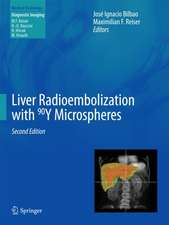Mouse Models of Cancer: Methods and Protocols: Methods in Molecular Biology, cartea 1267
Editat de Robert Eferl, Emilio Casanovaen Limba Engleză Paperback – 5 oct 2016
Cutting-edge and resourceful, Mouse Models of Cancers: Methods and Protocols, is a valuable laboratory resource for all researchers, from the graduate level upwards, who study cancer and new possibilities for its treatment.
| Toate formatele și edițiile | Preț | Express |
|---|---|---|
| Paperback (1) | 739.45 lei 38-44 zile | |
| Springer – 5 oct 2016 | 739.45 lei 38-44 zile | |
| Hardback (1) | 740.79 lei 6-8 săpt. | |
| Springer – 31 ian 2015 | 740.79 lei 6-8 săpt. |
Din seria Methods in Molecular Biology
- 9%
 Preț: 791.59 lei
Preț: 791.59 lei - 23%
 Preț: 598.56 lei
Preț: 598.56 lei - 20%
 Preț: 882.95 lei
Preț: 882.95 lei -
 Preț: 252.04 lei
Preț: 252.04 lei - 5%
 Preț: 802.69 lei
Preț: 802.69 lei - 5%
 Preț: 729.61 lei
Preț: 729.61 lei - 5%
 Preț: 731.43 lei
Preț: 731.43 lei - 5%
 Preț: 741.30 lei
Preț: 741.30 lei - 5%
 Preț: 747.16 lei
Preț: 747.16 lei - 15%
 Preț: 663.45 lei
Preț: 663.45 lei - 18%
 Preț: 1025.34 lei
Preț: 1025.34 lei - 5%
 Preț: 734.57 lei
Preț: 734.57 lei - 18%
 Preț: 914.20 lei
Preț: 914.20 lei - 15%
 Preț: 664.61 lei
Preț: 664.61 lei - 15%
 Preț: 654.12 lei
Preț: 654.12 lei - 18%
 Preț: 1414.74 lei
Preț: 1414.74 lei - 5%
 Preț: 742.60 lei
Preț: 742.60 lei - 20%
 Preț: 821.63 lei
Preț: 821.63 lei - 18%
 Preț: 972.30 lei
Preț: 972.30 lei - 15%
 Preț: 660.49 lei
Preț: 660.49 lei - 5%
 Preț: 738.41 lei
Preț: 738.41 lei - 18%
 Preț: 984.92 lei
Preț: 984.92 lei - 5%
 Preț: 733.29 lei
Preț: 733.29 lei -
 Preț: 392.58 lei
Preț: 392.58 lei - 5%
 Preț: 746.26 lei
Preț: 746.26 lei - 18%
 Preț: 962.66 lei
Preț: 962.66 lei - 23%
 Preț: 860.21 lei
Preț: 860.21 lei - 15%
 Preț: 652.64 lei
Preț: 652.64 lei - 5%
 Preț: 1055.50 lei
Preț: 1055.50 lei - 23%
 Preț: 883.85 lei
Preț: 883.85 lei - 19%
 Preț: 491.88 lei
Preț: 491.88 lei - 5%
 Preț: 1038.84 lei
Preț: 1038.84 lei - 5%
 Preț: 524.15 lei
Preț: 524.15 lei - 18%
 Preț: 2122.34 lei
Preț: 2122.34 lei - 5%
 Preț: 1299.23 lei
Preț: 1299.23 lei - 5%
 Preț: 1339.10 lei
Preț: 1339.10 lei - 18%
 Preț: 1390.26 lei
Preț: 1390.26 lei - 18%
 Preț: 1395.63 lei
Preț: 1395.63 lei - 18%
 Preț: 1129.65 lei
Preț: 1129.65 lei - 18%
 Preț: 1408.26 lei
Preț: 1408.26 lei - 18%
 Preț: 1124.92 lei
Preț: 1124.92 lei - 18%
 Preț: 966.27 lei
Preț: 966.27 lei - 5%
 Preț: 1299.99 lei
Preț: 1299.99 lei - 5%
 Preț: 1108.51 lei
Preț: 1108.51 lei - 5%
 Preț: 983.72 lei
Preț: 983.72 lei - 5%
 Preț: 728.16 lei
Preț: 728.16 lei - 18%
 Preț: 1118.62 lei
Preț: 1118.62 lei - 18%
 Preț: 955.25 lei
Preț: 955.25 lei - 5%
 Preț: 1035.60 lei
Preț: 1035.60 lei - 18%
 Preț: 1400.35 lei
Preț: 1400.35 lei
Preț: 739.45 lei
Preț vechi: 778.37 lei
-5% Nou
Puncte Express: 1109
Preț estimativ în valută:
141.49€ • 148.13$ • 117.08£
141.49€ • 148.13$ • 117.08£
Carte tipărită la comandă
Livrare economică 01-07 aprilie
Preluare comenzi: 021 569.72.76
Specificații
ISBN-13: 9781493948444
ISBN-10: 149394844X
Pagini: 463
Ilustrații: XI, 463 p. 96 illus., 87 illus. in color.
Dimensiuni: 178 x 254 mm
Ediția:Softcover reprint of the original 1st ed. 2015
Editura: Springer
Colecția Humana
Seria Methods in Molecular Biology
Locul publicării:New York, NY, United States
ISBN-10: 149394844X
Pagini: 463
Ilustrații: XI, 463 p. 96 illus., 87 illus. in color.
Dimensiuni: 178 x 254 mm
Ediția:Softcover reprint of the original 1st ed. 2015
Editura: Springer
Colecția Humana
Seria Methods in Molecular Biology
Locul publicării:New York, NY, United States
Cuprins
Modeling Cancer Using Genetically Engineered Mice.- Lung Adenocarcinomas: Comparison Between Mice and Men.- Mouse Models of Breast Cancer.- Genetically Engineered Mouse Models to Study Prostate Cancer.- Practical Use of Advanced Mouse Models for Lung Cancer.- Generation and Analysis of Mouse Intestinal Tumors and Organoids Harboring APC and K-Ras Mutations.- Induction of Colorectal Cancer in Mice and Histomorphometric Evaluation of Tumors.- Mouse Models of Liver Cancer.- Current Methods in Mouse Models of Pancreatic Cancer.- Mouse Models of Non-Melanoma Skin Cancer.- Clinicopathological Characterization of Mouse Models of Melanoma.- Modeling BCR/ABL Driven Malignancies in the Mouse.- Methods to Generate Genetically-Engineered Mouse Models of Soft-Tissue Sarcoma.- Characterization of Mouse Model-derived Osteosarcoma (OS) Cells in vitro and in vivo.- Genetically Engineered Mouse and Orthotopic Human Tumor Xenograft Models of Retinoblastoma.- Tumor Imaging Technologies in Mouse Models.- Tumor Angiogenesis: Methods to Analyze Tumor Vasculature and Vessel Normalization in Mouse Models of Cancers.- Transplantable Mouse Tumor Models of Breast Cancer Metastasis.- Methods to Study Tumor Cells and Residual Tumor Cells in Mouse Models of Oncogene Dependence.- Generation of Transgenic Mouse Model Using PTTG as an Oncogene.- Modeling the Study of DNA Damage Responses in Mice.- Methods to Study Tumor Surveillance Using Tumor Cell Transplantation into Genetically Engineered Mice.
Textul de pe ultima copertă
This volume is essential for geneticists, molecular biologists, biochemists, and medical doctors interested in the use of mouse models in cancer research. Recent genome studies, together with refined genetic engineering techniques, have greatly increased the value of using mice for research on cancer and other human disorders. The chapters of this book will support scientists in choosing the most suitable mouse models for their research questions. The book provides detailed methodological information for genetic or chemical induction of different types of cancer, histomorphometric cancer analysis, and in vivo imaging, as well as protocols to investigate oncogene addiction, immune surveillance, and hallmarks of cancer such as angiogenesis or metastasis. Four review-like articles provide background information on mouse technologies and histopathologic differences between mouse and human cancers. The mouse models described in individual chapters will fuel the understanding of cancer initiation, immune system roles, tumor angiogenesis, invasion, metastasis, and the relevance of molecular diversity observed among human cancers. Written in the highly successful Methods in Molecular Biology series format, chapters include introductions to their respective topics, lists of the necessary materials and reagents, step-by-step, readily reproducible laboratory protocols, and tips on troubleshooting and avoiding known pitfalls.
Cutting-edge and resourceful, Mouse Models of Cancers: Methods and Protocols, is a valuable laboratory resource for all researchers, from the graduate level upwards, who study cancer and new possibilities for its treatment.
Cutting-edge and resourceful, Mouse Models of Cancers: Methods and Protocols, is a valuable laboratory resource for all researchers, from the graduate level upwards, who study cancer and new possibilities for its treatment.
Caracteristici
Includes cutting-edge methods and protocols Provides step-by-step detail essential for reproducible results Contains key notes and implementation advice from the experts














